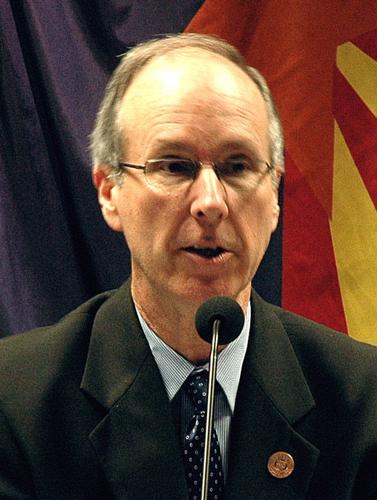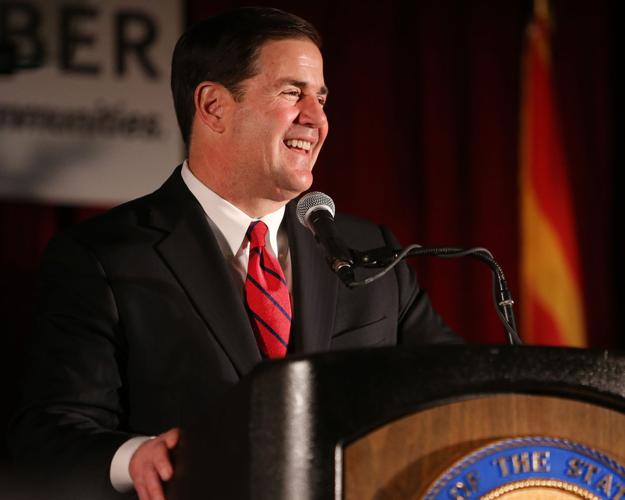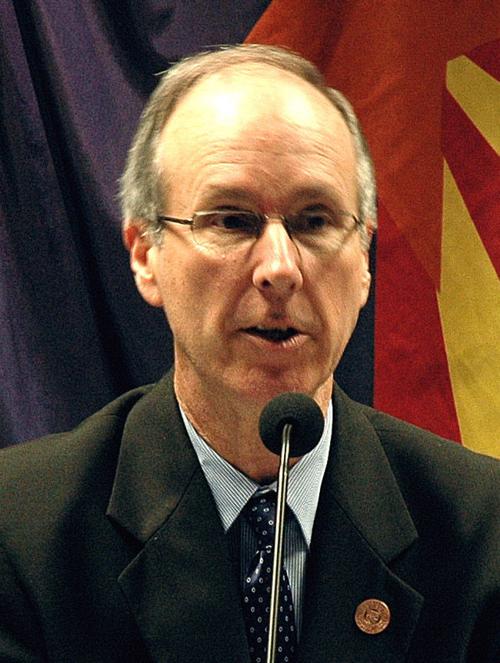PHOENIX — Gov. Doug Ducey is being asked to deny future legislatures — and even future voters — the power to mandate background checks on the private sale of guns.
HB 2524 would require Arizona to enter into a binding contract with other states that have also agreed not to impose any new requirements on the sale or transfer of guns beyond what is required under federal law.
Once entered into such an agreement, formally called a “compact,” the state would have only limited options to withdraw.
But the measure does more than show willingness of a majority of lawmakers to tie their own hands.
As crafted, it would overrule a provision in the Arizona Constitution that specifically gives voters the right to make their own laws. And it even would form a barrier to constitutional amendments, at least as far as guns are concerned.
Rep. Bob Thorpe, R-Flagstaff, who is pushing the measure, conceded the point. But he said there’s a very good reason for it: He wants to protect Arizonans from being talked out of their gun rights by former New York City Mayor Michael Bloomberg.
“He’s gone from state to state trying to push constitutional amendments within the state that take away people’s Second Amendment rights,” he said.
And he said that Bloomberg, who is a billionaire, has the kind of money to push voters in Arizona to adopt a law — and perhaps even a constitutional provision — to require a background check every time a weapon is transferred.
Arizona has no such law. The only requirement that exists now is for licensed gun dealers.
But there is a specific exemption for the person-to-person sale of weapons. And that has been interpreted to include individuals who go from gun show to gun show, selling multiple weapons.
With Congress unwilling to amend that law, Bloomberg has been eyeing a state-by-state effort, including going directly to voters in states like Arizona where the constitution permits such initiatives. It is exactly that eventuality that Thorpe wants to preclude.
“I’m trying to uphold established Second Amendment rights as far as firearms transfers,” he said.
Todd Rathner, a member of the National Rifle Association board, was more direct.
“The whole point is to try to stop some New York liberal with a bunch of money from imposing his values on the state of Arizona,” he said.
Those concerns are not academic.
In 2014, voters in Washington approved Proposition 594, which would expand background checks to include gun shows and private firearms sales. Of the approximate $11 million spent on that effort, at least $3.5 million came through Everytown for Gun Safety, set up by Bloomberg.
A similar measure, backed by the same group, is already set for the November ballot in Nevada. Bloomberg has pledged to spend $50 million on similar measures elsewhere.
Thorpe conceded his legislation could be seen as a method of denying voters in Arizona the same right.
“I get that,” he said. “And I don’t know if I have a perfect answer for you.”
But Thorpe said he sees overriding the right of initiatives as protecting a greater good.
“You look at what Bloomberg is trying to do,” he said.
“He’s trying to reduce constitutional rights,” Thorpe continued. “My bill ... is trying to uphold people’s constitutional rights.”
What makes the measure work legally is a 1949 federal law where Congress gave its consent for two or more states to enter into agreements to prevent crime “and in the establishment of their respective criminal laws and policies.”
Attorney Nick Dranias, who helped craft Thorpe’s bill when he was with the Goldwater Institute, said that means any agreement between states has the effect of federal law. And Dranias said federal law trumps not only state law but even state constitutions.
He said there is a long history of pre-empting voters from making their own laws.
For example, he said, Arizona is in a compact with other states over how to divide up water from the Colorado River.
Dranias said that’s a contract. Arizonans cannot vote to void a valid contract, no matter what the state constitution says.
Even if Ducey signs the measure, nothing will happen until at least one other state approves the same language.
Rathner said he’s working with Utah to do exactly that. And like Thorpe, his goal is stopping Bloomberg from doing here what happened in Washington.
“This is part of the education process and part of the strategic moves that we need to make in order to prevent them from walking in and doing what they did in Washington, which was to come in and spend $20 or $30 million and fool the voters,” Rathner said.
But should voters here be denied the right to make that decision? Rathner said the NRA believes that needs to be an option to protect the rights of gun owners.
“That’s what they pay the NRA for, that’s what they send their $25 in for, to make sure we’re doing everything we can to stop this stuff,” he said.
That presumes the legality of the plan is upheld.
“Whether or not this will work is going to end up, I believe, being decided by the courts,” Rathner said.
If nothing else, having the compact in place and forcing that court fight would slow up any initiative drive.







